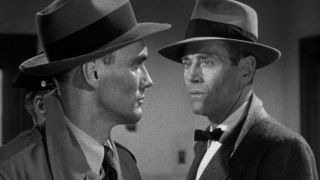The MacGuffin: News and Comment (26/May/2012)
(c) Ken Mogg (2012)
May 26
Last week I began to talk about Hitchcock's objectivity - a huge and important topic apropos that director. I originally included something said by the philosopher Kierkegaard but deleted it because I didn't have space to relate it to The Wrong Man, as I had intended. Well, here again is what Kierkegaard said: 'Most people are subjective towards themselves and objective towards others - terribly objective sometimes.' (He added that the real task is to be objective towards oneself and subjective towards others.) Wise words. And I'm sure that Hitchcock would have agreed with them. His films show compassion towards nearly all of his characters but also an appreciation of their human fallibility. In both those respects, no character is more representative than Manny Balestrero in The Wrong Man. Three years before Psycho, Manny is your 'typical bourgeoise' (as Hitchcock called Marion Crane), but his plight is treated with great empathy by Hitchcock (here being subjective, just as Kierkegaard recommended). At the same time, it is very clear that Manny is indeed only human, and of limited understanding. Nowhere is this better summed up than at the end of the film, when Manny comes face to face with his 'double', the holdup man for whom Manny had been mistaken (see frame-capture below). Let me draw a contrast. The confrontation isn't like that in one of Hitchcock's favourite novels, 'Great Expectations', of blacksmith Joe Gargery with convict Abel Magwitch, where salt-of-the-earth Joe calls the convict 'poor miserable fellow creature'. Rather, Manny shows a marked lack of magnanimity and a total failure to have learned a moral lesson from what he, and his family, have just endured. All he can say to his double is, 'Do you realise what you have done to my wife?' In other words, he is making exactly the same assumption about the other man's guilt, and lack of probity, as he had himself experienced. This is Hitchcock being objective not about Manny so much as about what people in general are like. In the discussion on our 'advanced' discussion group recently about this matter, I called for other examples of Hitchcock's objectivity. Someone, quite rightly, suggested that Hitchcock was influenced by the 'New Objectivity' movement (return to documentary realism) in German art and film in the 1920s. But it's only half the story, at best. Hitchcock and Fritz Lang were two directors who combined German Expressionism and the New Objectivity in their subsequent films, thereby making them even more expressive, at least potentially. Also, both Lang and Hitchcock were members of the Roman Catholic Church, which has impressive traditions of both philosophical thought and compassionate doubt. (I would argue that in Hitchcock's case his Englishness provided him with further stimuli again, not least the all-seeing tradition of Shakespeare and Dickens. More on this later.) In sum, that's largely why a film like The Wrong Man takes the form it does, why it has the theme it does, why it combines expressionism and social realism the way it does, and even why it cast Henry Fonda as Manny Balestrero - the Fonda who had appeared in Lang's You Only Live Once (1937) where he was already playing a man falsely accused of a crime and trapped in a web of circumstance. Now, to repeat, Manny's saying, 'Do you realise what you have done to my wife?' is very human of him. You imagine Hitchcock smiling grimly at the line, knowing that many people expend great energy to justify what has happened to them (perhaps, as here, even playing the blame game) but avoid seeing the reality of their situation - perhaps because it would be painful. In this respect, The Wrong Man is almost surreal - which means 'objective' in the biggest possible way. Now, I want to take up next time - still in the context of Hitchcock's objectivity - the matter of Catholic doubt, mentioned above. I'll refer to the Merryl Streep film Doubt (John Patrick Shanley, 2008).
This material is copyright of Ken Mogg and the Hitchcock Scholars/'MacGuffin' website (home page) and is archived with the permission of the copyright holder. |

